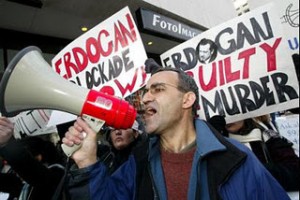Is it legal to speak Kurdish in Turkey?
The Prime Minister of Turkey claims the Kurdish language is legal in Turkey because he has opened a Kurdish channel, and at least one academic institution teaches Kurmancî. Despite this, Kurdish activists in Turkey are unable to speak Kurdish within a court of law, as Kani Xulam — Director of American-Kurdish Information Network (AKIN) points out on News.Am.
He says Kurdish is legal in Turkey and that he has allowed a Kurdish television. He is basically lying on both counts. Kurdish remains illegal in Turkey. When Kurds in Diyarbakir who are accused of being members of KCK want to defend themselves in Kurdish, the Judge tells them they are speaking in an unknown language.
If Kurdish language is recognised as an ethnic language within Turkey, why can’t Kurdish political prisoners defend themselves in a court of law in Kurdish? Turkey’s barbaric treatment of Kurds has shown the concessions made are simply an appeasement to international pressures and not genuine concerns with the rights of Kurdish people.
Kurdish language was banned in Turkey for decades, it was only 72 years after the creation of modern Turkey that Kurdish people were granted the right to speak Kurdish in 1991. This didn’t include writing, teaching or giving sermons in Kurdish. All Kurdish publications were banned, and the question remains — is it legal to speak Kurdish in Turkey since Kurdish politicians can’t defend themselves in Kurdish while on trial.
In 2009, a Turkish University allowed the teaching of Kurmancî for the first time since the ban on speaking Kurdish was lifted in 1991. The reason for improving Kurdish cultural rights came after EU urged Turkey, which is why language bans have been lifted but not completely. Many Kurdish people were stripped of their right to speak Kurmancî because of the ban, and academic disciplines are still not taught in Kurmancî within Turkey.
Turkey might have given up its dreams of joining EU but its aspirations to play a regional role with the rise of Pan-arabism can’t be possible unless Kurdish people are granted constitutionally protected rights. And unless its treatment of Kurdish people progresses, it will never be seen as a regional player.

Comments are closed.